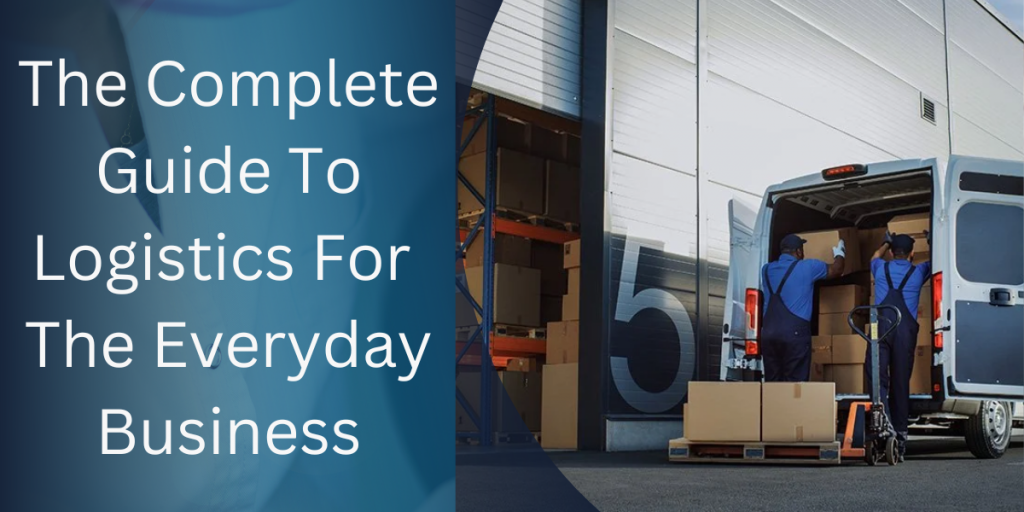The Complete Guide To Logistics For The Everyday Business

Logistics. It’s a word that gets thrown around a lot in business, but what does it actually mean? In short, logistics is the coordination of all the elements involved in a company’s operations, from the raw materials to the finished product.
Now that we’ve got that out of the way, let’s take a more in-depth look at logistics and how it can help your business. This guide will explore everything from the basics of logistics to more complex concepts, so that you can make the most out of this crucial element of business.
What is logistics?
In business, logistics is the coordination of supply chain management and the transportation of goods. The term logistics comes from the Greek word for calculation, which is a fitting name for a process that is all about intricate planning and execution.
Logistics is responsible for making sure that materials and products flow smoothly through the supply chain from supplier to customer. This process includes everything from procurement and inventory management to warehousing and transportation. An efficient logistics operation is critical to keeping costs down and ensuring timely delivery of goods.
There are many different types of logistics operations, but they all share the same goal: to get the right product to the right place at the right time.
The different types of logistics
There are many different types of logistics, each with their own unique set of benefits and drawbacks. The most common type of logistics is transportation logistics, which is the process of planning, executing, and controlling the movement of goods and materials. This type of logistics is often used in manufacturing and distribution operations. Other types of logistics include inventory management, warehousing, and order fulfillment.
The benefits of logistics
There are a number of benefits that come with implementing logistics into your business. Perhaps the most obvious benefit is that it can help to save you money. By streamlining your operations and making them more efficient, you can cut down on a lot of wasted time and resources. In addition, logistics can help to improve customer service levels.
By having a well-organized system in place, you can ensure that orders are fulfilled quickly and accurately, which will keep your customers happy. Finally, logistics can also help to improve your company’s overall competitiveness. By being able to get products to market faster and more efficiently than your competitors, you’ll be able to gain an edge over them.
If You are Lookig For Best Logistics Company In Dubai then Click On The Blow Button.

The challenges of logistics
The challenges of logistics are many and varied, but they can be boiled down to a few key areas: cost, complexity, coordination, and customer service. Let’s take a closer look at each of these challenges.
Cost: The cost of logistics can be a major challenge for businesses. Transportation and storage costs can add up quickly, and there is always the risk of lost or damaged goods.
Complexity: The logistics process can be very complex, with many different moving parts. Coordinating all of these elements can be a challenge, and even small disruptions can cause big problems.
Coordination: Good coordination is essential for smooth logistics operations. All of the different players in the supply chain must work together seamlessly to avoid delays and disruptions.
Customer Service: The ultimate goal of any business is to satisfy its customers. This can be difficult to achieve in the world of logistics, where things often go wrong despite everyone’s best efforts. When customers are not happy with the service they receive, it can reflect poorly on the business as a whole.
How to overcome the challenges of logistics
There are many challenges that logistics can pose for businesses. However, by following some simple steps, these challenges can be overcome relatively easily.
One of the biggest challenges is ensuring that goods arrive on time and in good condition. This can be achieved by working with a reliable and reputable logistics company. They will have the experience and resources to ensure that your goods arrive on time and in the condition you expect them to be in.
Another challenge is managing inventory levels effectively. This can be done by using an inventory management system, which will help you to keep track of stock levels and reorder when necessary.
Finally, another challenge that businesses face is dealing with unexpected delays or problems with shipments. Again, working with a reputable logistics company can help to minimise these problems, as they will have contingency plans in place to deal with such eventualities.



